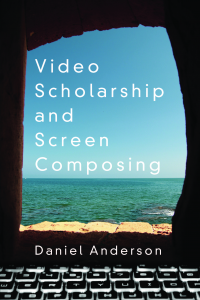 Daniel Anderson’s latest project, Video Scholarship and Screen Composing, has been published (University of Michigan Press, 2021).
Daniel Anderson’s latest project, Video Scholarship and Screen Composing, has been published (University of Michigan Press, 2021).
“The work brings together twelve videos to explore the ways scholarship shifts as it moves from page to screen. For decades, we have heard about the potential of multimedia to transform scholarship, teaching, and composition. Most of these claims, however, have been articulated using the text-centric materials of the printed word. Video Scholarship and Screen Composing flips this approach, foregrounding the moving images, sounds, and words that come together in digital video.
Digital screens bring to composing unique affordances that feature layering, windows, and composites of media materials. When we focus deliberately on these spaces, our familiar approaches based in print are brought into sharp relief. We recognize that print favors linearity, logic, and argument. A focus on the screen reveals alternative possibilities linked with emotions and open-ended readings. Screen-based approaches can extend and complement our traditional behaviors. Rather than choosing between print and digital means of creating and sharing knowledge, we can learn more about each as we engage with screen composing. The twelve videos in the collection speak to intellectual concerns as they experiment with the possibilities of digital composing. Traditional approaches are questioned in videos that point out the competitive aspects of the ways that scholars typically engage one another.
Similar questions are raised about the ways that scholarship often aims for closure rather than opening up meaning. Videos also focus on aspects of media that shape understanding. Sonic materials, for instance, convey meaning through emotional registers that yield more ambiguity than we might associate with printed texts. Composers, then, find themselves managing attention for viewers and making decisions about levels of decipherability as they bring together images, sounds, and words. These questions of meaning shed further light on theoretical concerns. Videos take up the relationships among humans and machines, networked conceptions of knowledge, and speculative modes of understanding the material world. All of these possibilities also reshape what happens in the classroom. Videos also explore teaching that extends print behaviors and expectations through the possibilities that emerge through screen composing.”
The web version of Video Scholarship and Screen Composing is available at https://digitalrhetoriccollaborative.org/video-scholarship-and-screen-composing/ and the e-pub version is at https://doi.org/10.3998/mpub.6970425.

